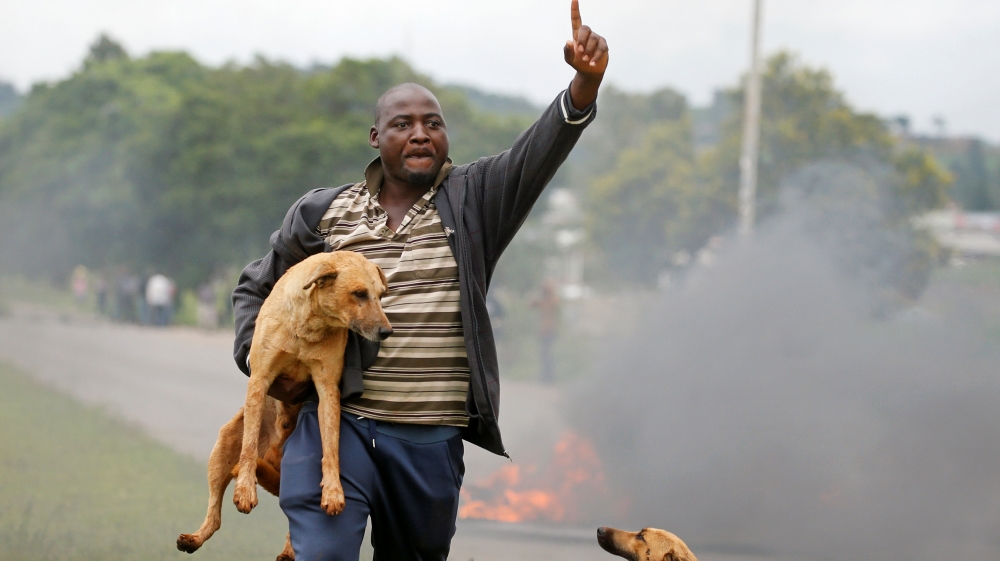Zimbabwe imposes internet shutdown amid crackdown on protests
Zimbabwe has imposed a “total internet shutdown” in what critics called an attempt to hide growing reports of a violent crackdown on protests against a dramatic fuel price increase.
On Friday, badly injured people streamed into a hospital in the capital, Harare, after the alleged assaults by security forces.
Petrol in the economically shattered country is now the world’s most expensive and Zimbabweans heeded a nationwide stay-at-home call earlier this week in protest.
Others took to the streets. Since then, graphic reports have emerged of security forces targeting activists and labour leaders while the government of President Emmerson Mnangagwa blames the opposition for the unrest.
“Our country is going through one of the most trying periods in its history,” the Zimbabwe Catholic Bishops’ Conference said in a sweeping statement lamenting the government’s “intolerant handling of dissent” and its failure to halt the economic collapse.
Access to the internet and popular social media apps like Facebook, Twitter and WhatsApp has been intermittently blocked as the country’s largest telecom company, Econet, sends customers text messages relaying the government’s orders and calling the situation “beyond our reasonable control.”
Hundreds of Zimbabweans were arrested during the protests on Friday on public order charges, as the United Nations urged an end to the brutal security crackdown and the internet blackout.
Among the around 400 people charged by magistrates was pastor Evan Mawarire, a rights activist who rose to prominence as a critic of Robert Mugabe’s rule and led a national protest in 2016.
The pastor called it “heartbreaking” to see the new government of President Mnangagwa acting like that of former leader Mugabe.
He will stand trial on more serious charges of subverting the government after encouraging Zimbabweans via social media to heed a strike call from unions.
His lawyer Beatrice Mtetwa said she would lodge a High Court appeal for his release on bail. Mawarire faces up to 20 years in jail if convicted.
UN Secretary-General Antonio Guterres appealed for restraint by the Zimbabwean authorities.
“We are worried with the deterioration of the situation caused by the potential use of excessive violence in confronting the demonstrations in Zimbabwe,” Guterres told a news conference in New York on Friday.
 |
| A protester gestures as he holds a dog before a burning barricade during protests in Harare [File: Philimon Bulawayo/Reuters] |
Mnangagwa is set to plead for more international investment in Zimbabwe at the World Economic Forum in Davos, Switzerland.
He announced the fuel price increase on the eve of his overseas trip, leaving hardline former military commander and Vice President Constantino Chiwenga as the acting president.
The Zimbabwe Association of Doctors for Human Rights has said it had treated 68 cases of gunshot wounds and over 100 other cases of “assaults with sharp objects, booted feet, baton sticks” and more.
Zimbabweans had briefly rejoiced when Mnangagwa succeeded Mugabe, who was forced out in late 2017, thinking the new president would deliver on his refrain that the country “is open for business”.
But frustration has risen over the lack of improvement in the collapsed economy, which doesn’t have a currency of its own.
The internet shutdown cuts off crucial access to the mobile money that Zimbabwe’s government uses to pay teachers and other public workers.
Some said they can no longer afford fares for public transport, and some shops have run out of basics such as bread.
The United Kingdom‘s minister for Africa, Harriett Baldwin, has summoned Zimbabwe’s ambassador to discuss “disturbing reports of the use of live ammunition, intimidation and excessive force” against protesters.
The European Union, in a statement late on Thursday, noted the “disproportionate use of force by security personnel” and urged that internet service be restored.




